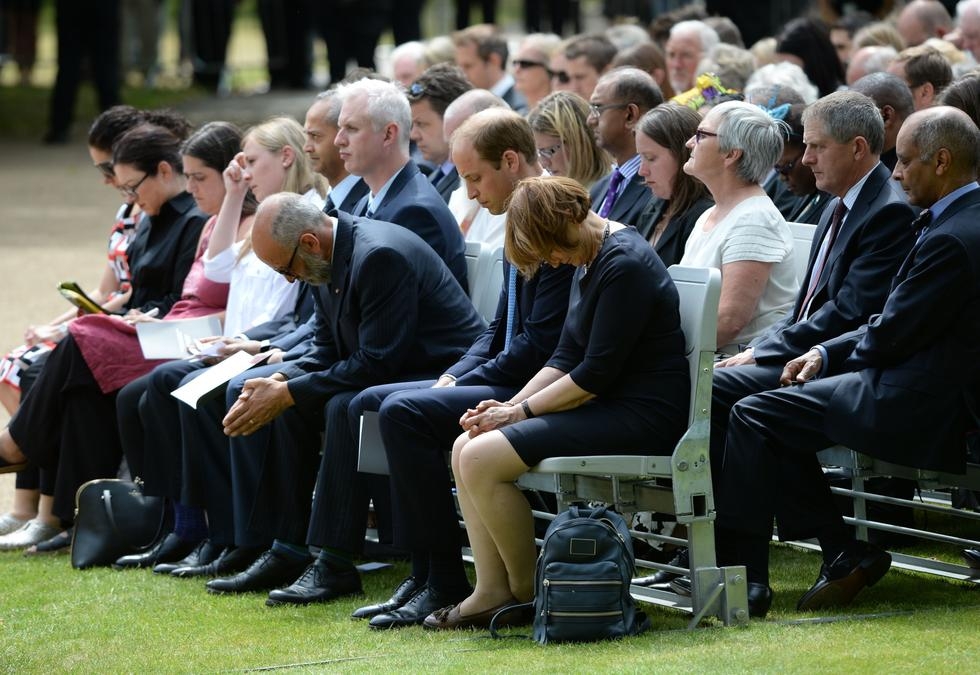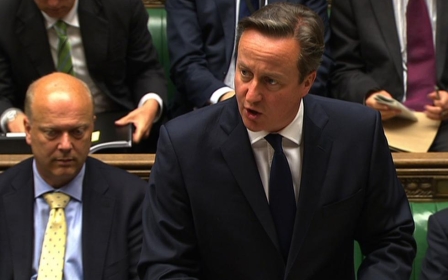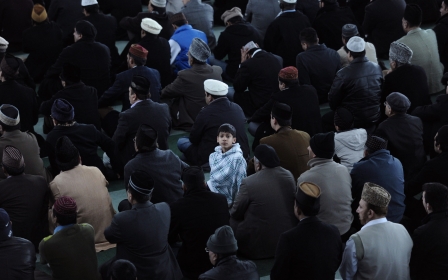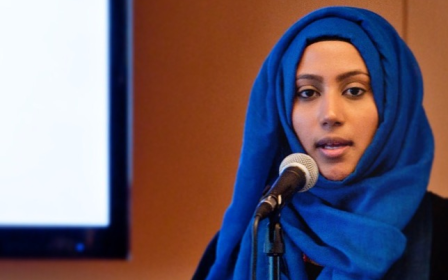Britain’s criminalisation of Muslim children

As Tuesday marked the 10th anniversary of the 7/7 attacks in London, I recall finishing my final AS Level exam when news broke of death and carnage in the capital. My sister, who worked in the city, was the first person that came to my mind as she commuted from Bedford to London every day.
But a more daunting thought consumes me whenever the 9/11 and 7/7 anniversaries arrive, and that is the measures that Britain took in response to these terrorist attacks. The government’s politically selective “one minute of silence” to remember those who were murdered in cold blood on 7/7 aside, the fact that senior security officials like Baroness Manningham-Buller warned of terrorist blowback prior to Britain invading Iraq cannot be ignored.
War on terror generation
As a British Muslim who grew up in the war on terror era, I have witnessed how the UK government’s counter-terrorism and anti-extremism laws have regressed, and become more Draconian as time progressed. Spying on Muslim children and students as a state policy was widely unheard of until recently, or at the very least, monitoring pupils for signs of “radicalisation” and extremism was not advocated by senior politicians so frequently and casually.
But it was in October 2006, during freshers week at university, when I read an article in The Guardian that reported that the Department for Education had urged university lecturers and staff across Britain to spy on "Asian-looking” Muslim students they suspected of being involved in “Islamic extremism”. Until that point, naively, I had never imagined that this country would actually resort to such Orwellian measures to “prevent extremism”.
Prevent duty for schools
The UK Government’s ever-failing counter-terrorism “Prevent” strategy, which was introduced by Tony Blair and made statutory by David Cameron under the Counter-Terrorism and Security Act 2015, continues to alienate large swathes of the Muslim community, who are collectively held responsible for the crimes committed by an ultra minority of their co-religionists. The Prevent programme, which has been described as “toxic” by former chief superintendent Dal Babu of the Met, and rejected by the National Union of Students (NUS), became a legal duty for schools to implement last Wednesday.
The Prevent duty guidelines stipulate that “all schools, registered early-years childcare providers and registered later-years childcare providers are subject to a duty under section 26 of the CTS Act 2015, in the exercise of their functions, to have due regard to the need to prevent people from being drawn into terrorism”. This statement, some have argued, was a new turning point in British history, where teachers and childminders became the state’s very own counter-terrorism officers – something which would make Britain’s founding fathers of liberal democracy turn in their graves.
Signs of radical children
Even prior to the CTS becoming law in February, civil rights group Liberty and the National Association of Head Teachers (NAHT) raised major concerns when Home Secretary Theresa May said that pupils as young as five should be reported to the authorities for “signs of extremism,” which followed even more outlandish comments made by London mayor Boris Johnson, who said children should be “taken into care” if they had radical parents.
Already cases have emerged of Muslim children as young as two being reported for relaying “worrying dreams” to their teachers, whilst others have been flagged for using “inappropriate language” such as “Alhamdulillah” (praise be to God in Arabic).
Four teachers cross-examined a teenager for merely requesting a prayer facility in a London secondary school. Reports of parents being visited by the police when the school raised concerns over their sons wearing trousers above their ankles, has also been brought to my attention. A three-year-old boy was reported for saying “I am going to kill you” as he was holding a water pistol, whilst a three-year-old girl was quizzed because she did not want to play with boys. All the aforementioned cases involved Muslim children, and occurred before last Wednesday.
What better contingency plan for the Tories, after both they and Labour failed miserably at converting thousands of disgruntled Muslim youth from the “war on terror generation” to submissive, apologetic and guilt-ridden patriots, than targeting Muslim children through teachers via anti-terror laws?
Counter-extremism curriculum
The British government has recently endorsed the “timely” launch of a “counter-extremism curriculum” by controversial Canadian cleric, Dr Tahir ul Qadri, who aims to make the syllabus compulsory in madrassas, and highly recommended as an optional module for Muslims in state schools. Ironically, the same individual who has previously propagated physical jihad, advocated the Caliphate as an ideal governing system, and played a pivotal role in upholding Pakistan’s blasphemy laws, has now become the saviour to the government’s worries regarding radicalisation, extremism and terrorism.
Dr Qadri, whose political aspirations in Pakistan came to an embarrassing end after the “Long March” from Lahore to Islamabad, was also the acclaimed author of a 600-page Fatwa on Terrorism and Suicide Bombing in 2010, which garnered huge support from the British government. The “coincidental” timing of his counter-terrorism curriculum is conveniently aligned to the UK government’s narrative of blaming “Islamist ideology” for Britons leaving to join ISIS, which has been the political justification behind the CTS Act, as well as the proposed Counter-Extremism Bill.
Whilst young British Muslims travelling to Syria to join the so-called Islamic State is a legitimate concern for the government and the Muslim community alike, the reality is that the numbers of those that have left are intentionally exaggerated by politicians, over-exemplified by security officials, and heavily misrepresented in the media.
By solely focusing on “Islamist ideology” as a precursor to violent extremism under the empirically unsubstantiated and academically refuted conveyor belt theory, the British government will only create another generation of Muslim youth that will be further alienated and disenfranchised than the “war on terror” generation that I grew up in.
A range of causes
No rational human being with sincere intentions to holistically approach the issue of radicalisation of Muslims in Britain would exclusively blame ideology or foreign policy grievances as the root cause of home-grown terrorism. The difference between “sole,” “significant” and “partial” blame must be distinguished. This also has to be validated by empirical evidence, not kneejerk agenda-driven policies.
The wider picture would include legitimate foreign policy grievances - which the perpetrators of 7/7 and Woolwich clearly stated - and in some cases the mistreatment of individuals by the security service, exposure to a fringe interpretation of Islam, socioeconomic deprivation, as well as psychological issues that can lead to exceptional cases of violent extremism.
If the British government believes it can wage an ideological war of indoctrination and criminalisation against Muslim children under the facade of “preventing terrorism” through legislations like the CTS Act, then it cannot be taken seriously in wanting to address this matter. Growing up in the UK at a time of rising Islamophobia, increasing anti-Muslim hate crimes, and a general political shift towards the right after the general election is worrying enough for Muslims. For Muslim children to then be treated as suspects at such a young age, to put it quite simply, is a disaster in the making.
Dilly Hussain is the deputy editor of British Muslim news site 5Pillars. He also writes for the Huffington Post, Al Jazeera English, and contributes to the Foreign Policy Journal and Ceasefire Magazine. He regularly appears on Islam Channel, Russia Today, and BBC TV and radio discussing Middle East and North African politics, British foreign policy, Islamophobia and the war on terror. Find him on Twitter @dillyhussain88
The views expressed in this article belong to the author and do not necessarily reflect the editorial policy of Middle East Eye.
Photo: Britain's Prince William, Duke of Cambridge (C) bows his head during a service at the 7/7 memorial in London's Hyde Park on July 7, 2015, in memory of the 52 people killed during the 7/7 London bombings of 2005. (AFP)
Middle East Eye propose une couverture et une analyse indépendantes et incomparables du Moyen-Orient, de l’Afrique du Nord et d’autres régions du monde. Pour en savoir plus sur la reprise de ce contenu et les frais qui s’appliquent, veuillez remplir ce formulaire [en anglais]. Pour en savoir plus sur MEE, cliquez ici [en anglais].





